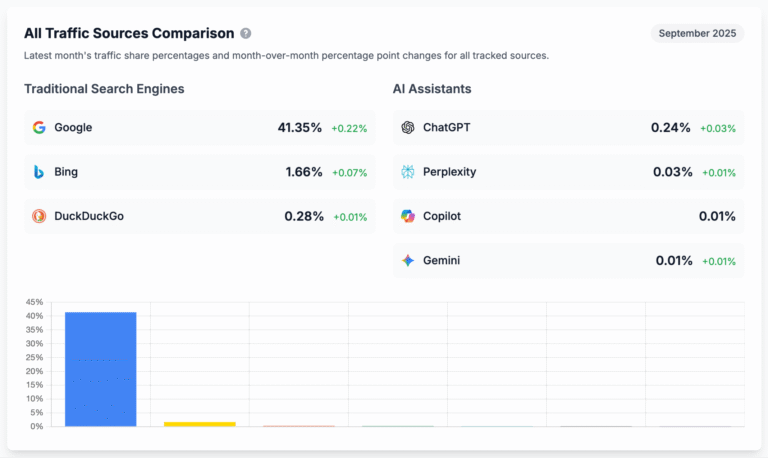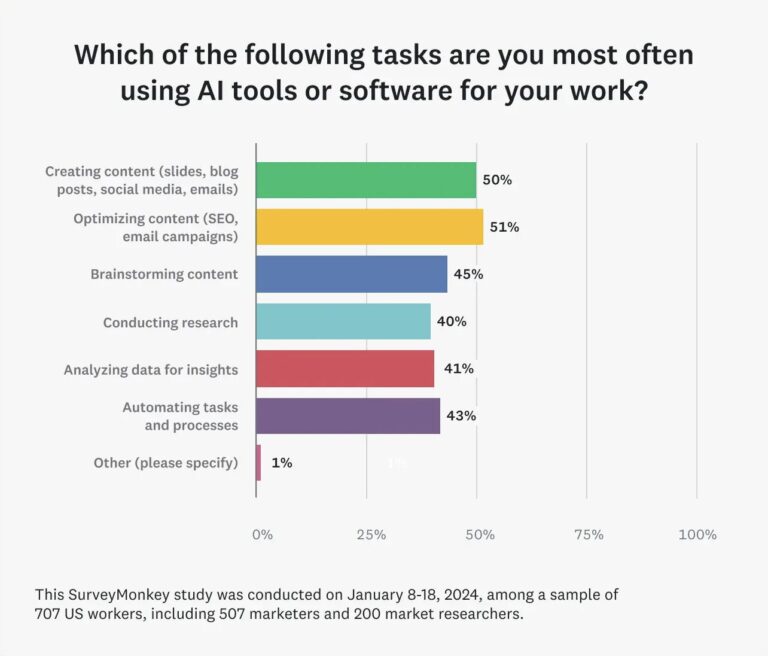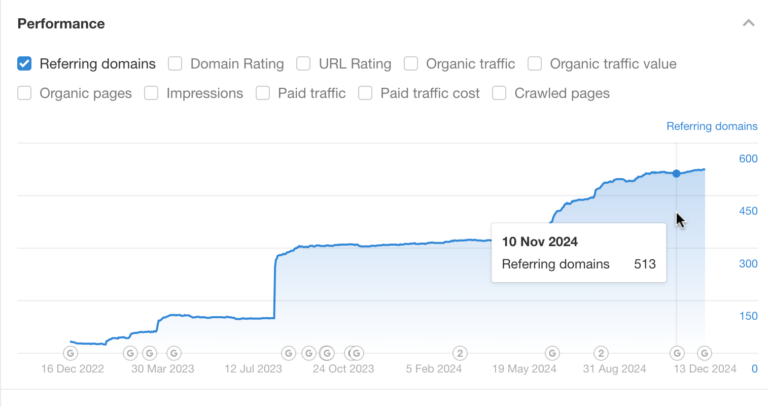When most marketers think about SEO, they jump straight to keywords like “best running shoes” or “how to do [whatever]”. Non-branded, high-intent, top-of-funnel stuff.
But our latest study might surprise you:
Nearly half of all Google searches (45.7%) are branded searches—meaning people are actively seeking out specific companies and products they already know.

Yep, nearly half of what people type into Google includes a brand name or a product name.
It’s based on a massive Ahrefs study of ~150 million U.S. keywords. We’re talking hard data.
So, if you’re not actively considering brand marketing and branded search in your marketing strategy, you might be missing out on a huge piece of the pie.

(Shout out to Rand Fishkin for encouraging us to dig deeper on this.)

This also enables you to easily track branded vs. non-branded traffic performance in Site Explorer (Overview report).

3. You can (and should) optimize for branded search
The homepage isn’t the only result page searchers might be looking for. They could be looking for support pages, specific products, reviews, or local listings.
That’s why it’s worth auditing how your branded queries perform and making sure you control the full branded SERP with helpful, relevant content. Think of it as owning your reputation, not just your homepage.
Let me give you two examples from our turf.
People were asking Google whether we had a program for affiliates, and since we didn’t have a page that answered that, Google tried “its best” pulling up a page that contained the words “ahrefs” and “affiliate”. Not the best experience, and this was our fault. We fixed that with a quick blog post.

Another example. Some people like to see what’s new in Ahrefs by searching for something like “ahrefs new”. Before we introduced a changelog that consolidated all product updates, the SERP was chaos.

- Hugo H. Macedo argued that many branded searches are just navigational: people typing a brand into their browser bar and hitting enter. It’s not always brand awareness—sometimes it’s just habit. Or as Alek Asaduryan suggested, Google has become a default navigational tool, not just a research engine.
- Stefan Repin pointed out that demand is now often created outside of Google—on social media, podcasts, and other platforms—and Google serves more as the place people go once interest is sparked.
- Isabel Hughes and Shawn Busse highlighted the murky waters of attribution. Just because someone typed your brand into Google doesn’t mean search was their first touchpoint.
- John Emoavwodua emphasized that branded search is often a sign of people moving further down the funnel—seeking more info after discovering your brand elsewhere.
- Mike Escott made the case that a declining brand leads to fewer branded searches, and generic search performance will eventually suffer too (this is something that deserves a study on its own).
- Joshua Squires raised a great point about retailers who don’t own the brands they sell—what does branded search mean for them?
- Michael Fertman pointed out that offline channels (like billboards) can drive branded search volume too. It’s not just digital.
- Marcel Nanning summed it up well: strong branding makes everything else easier.
Final thoughts
This study is one more reminder that brand matters—a lot. Even as the search landscape shifts with things like AI Overviews, brand still stands out as a key driver of visibility in the SERPs.
In fact, I’d argue brand marketing is the most underappreciated SEO strategy. When I analyzed SEO tactics of Nasdaq-listed companies, brand strength kept showing up as an entity within Google’s knowledge graph that can win SERPS.
I also found that companies that have a branded version of an unbranded keyword, like “mortgage calculator” versus “NerdWallet mortgage calculator”, tend to rank higher for the generic term, too. Again, brand marketing has an impact on SEO.
So if you’re investing in SEO, don’t overlook brand. It’s doing more of the work than most people realize.
Got questions or comments? Let me or Tim know, or drop a comment in the discussion on LinkedIn.
Similar Posts

How to Earn LLM Citations to Build Traffic & Authority
Ask ChatGPT, “How much does SEO cost?” and you’ll likely see Ahrefs cited as a source. Ask Claude about email marketing benchmarks, and Mailchimp’s data appears. Search Perplexity for project management tips, and Asana’s guides get referenced. At first glance, it looks like only big brands get cited in AI answers. In the top 10…

16 of the Best AI Marketing Tools We’ve Tried & Spied in 2025
We’ve shared, discussed, tested out, and invested in a whole tech stack’s worth of different AI marketing tools lately. Below, you’ll find some we love and use every day, and others we’re keeping a keen eye on in 2025. ad targeting, according to research from SurveyMonkey. The best AI marketing tools help users save time and…

Are Stock Prices and Organic Traffic Correlated? I Analyzed 2,000 Public Companies to Find Out
SEO and the stock market — two completely different worlds. Yet when you run a correlation analysis between organic traffic and stock price on, say, Nasdaq, you suddenly get a strong positive correlation. Here’s why that happens and what it means. Ahrefs API and Polygon’s APIs to get the stock monthly closing price, monthly market cap,…

GEO, LLMO, AEO… It’s All Just SEO
As a marketer, I want to know if there are specific things I should do to improve our LLM visibility that I am not currently doing as part of my routine marketing and SEO efforts. So far, it doesn’t seem like it. There seems to be massive overlap in SEO and GEO, such that it doesn’t…
Automatic Updates: Is It Right for Your Drupal Site? 🤔
Keeping a Drupal site secure means staying on top of security updates, which are a kind of patch-level update. You may have heard of Automatic Updates, a tool that helps you apply patch-level updates to your site without the need to manually use Composer on the command line. Perhaps you’ve installed Drupal CMS and encountered…
Release Day: Single Directory Components in Drupal
We’ve heard from many of you that you want to learn more about Single Directory Components (SDCs) in Drupal. Which makes sense, since they are one of the most exciting new features in Drupal theming since Twig was added to Drupal 8. We’re excited to share that the first phase of our brand-new SDC course…
